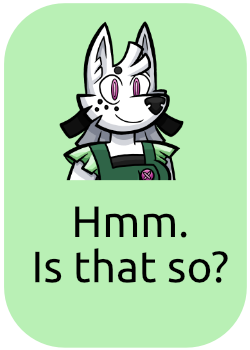Cryptid Kitchen explains many aspects of flourishing. The content is grouped into topic areas. Knowledge nuggets about depression are in a desert.

Like every area, it starts with a sign, introducing the topic. As you walk through the area, you find knowledge nuggets. It ends with a concluder, summarizing the topic.
Here are the knowledge nuggets at the time of writing. They’ve probably changed, though. Look in the game for the latest stuff.
About 5% of adults have depression (World Health Organization). That makes it one of the most common illnesses.
Teagan and Kieran are in that 5%.
What is depression? Why does it happen? What can you do about it? That’s what you’ll learn in the desert.
 Seriously? You use a desert for this?
Seriously? You use a desert for this?
Isn’t that kinda depressing?
When something happens, you explain to yourself why. At the core of depression, is what explanations you choose for bad things that happen. Was it something you did? Was it bad luck? Could you learn to do better?
You use your explanations to predict the future. If it was just bad luck, then you might try again. If you think the bad thing was because you’re not good enough, what’s the point of trying again?
The psychologist Beck wrote about the thought habits depressed people have about themselves, the world, and the future. First, they personalize failure. “The bad thing happened because I’m no good.” Actually, what happens to us, good and bad, is as much luck as anything else.
Depressed people tend to overgeneralize. “I’ll always fail,” rather than “I failed this one time.”
Depressed people jump to negative conclusions without evidence. They magnify as well. “I spilled that milk, so everyone will hate me, and I’ll die alone.”
There are two kinds of answers. One is at the species level, the other at the individual level.
Species: Why do depressed humans exist?
 I gotta wonder about evolution. Wouldn’t depression have died out, because of natural selection?
I gotta wonder about evolution. Wouldn’t depression have died out, because of natural selection? Hmm… not really. Depressed people don’t go out as much, so wouldn’t they have fewer kids?
Hmm… not really. Depressed people don’t go out as much, so wouldn’t they have fewer kids? Oh! If there are animals running around trying to eat you, then staying in your home-camp-garden, or whatever, you’d be safer.
Oh! If there are animals running around trying to eat you, then staying in your home-camp-garden, or whatever, you’d be safer. So for our species, it’s best to have depressed and non-depressed people, so we keep having kids, in all sorts of situations.
So for our species, it’s best to have depressed and non-depressed people, so we keep having kids, in all sorts of situations. Wait. I just had a thought. This only make sense if depression is heritable. If it isn’t passed down through generations, evolution doesn’t matter for depression.
Wait. I just had a thought. This only make sense if depression is heritable. If it isn’t passed down through generations, evolution doesn’t matter for depression.Psychologist Jonathon Haidt (one of our fave experts on flourishing) writes about the “cortical lottery.” The frontal cortex is a part of your brain, where thinking and decision making happens. If you’re unlucky, you inherited a cortex that tends towards depression. (There are things you can do, though, so don’t think you have to be depressed forever.)
Individual trauma
Besides being heritable, depression is also caused by things that happen to people.
Remember, at its core, depression is about how people explain bad things. Depressed people make the bad things their fault, whether they are or not.
Things like sexual abuse, domestic abuse, and gaslighting, can increase depression. In gaslighting, one person manipulates another, to warp their reality, including why things happen. A common tactic is to convince the victim that everything is their fault.
 Wow. That’s what depression is all about. Oh, and maybe the abuser says things like, “I’m the only one who can love someone as useless as you.”
Wow. That’s what depression is all about. Oh, and maybe the abuser says things like, “I’m the only one who can love someone as useless as you.” Some people say I’m depressed ’cause I’m, like, weak, or something.
Some people say I’m depressed ’cause I’m, like, weak, or something.Your genes are your genes. You don’t get to choose them.
Say Jill wears glasses. She’s short-sighted, like her parents. Is Jill weak? Should she just buck up, and make her eyes see right?
 Of course not! That would be silly.
Of course not! That would be silly.What if Jill was in a car crash when she was a child, that left her with a limp. That’s a character flaw, right?
 Dude, no way! She couldn’t help being injured like that! I’d have to be really mean to think that!
Dude, no way! She couldn’t help being injured like that! I’d have to be really mean to think that!Depression is invisible, unlike glasses, or walking with a limp. Yet just like those things, genetic inheritance and trauma can cause depression.
Overcoming depression isn’t a matter of just “being strong.” There are things you can do, like just there are things you can do about poor vision, but it’s not about someone’s character. Thinking someone can just “be strong” is naive.
 Yeah, but some people still think that. They look at me like I’m just weak.
Yeah, but some people still think that. They look at me like I’m just weak.There’s not much you can do about them.
The more important thing is what you believe, and how much you think their judgements of you are right.
If you find yourself feeling you’re weak because you’re depressed, challenge those thoughts. Remind yourself that it isn’t true. Tell yourself…
Welp, here go my genes again.
Do things you know reduce depression, like play with your dog. You have a dog, right? Dogs are the best things ever!
One more thing. I’m no doctor (well, not that kind). This is what I’ve read, and works for me. If your depressed, you should see a medical person about it.
There are three main treatments for depression: cognitive, medication, and meditation. This nugget is about cognitive treatments.
Remember that depressed people blame themselves when things do wrong.
- They personalize failure. “The bad thing happened because I’m no good.”
- They overgeneralize. “I’ll always fail,” rather than “I failed this one time.”
- They jump to conclusions, and magnify. “I failed. Again. Everyone hates me, and I’ll die alone.”
Those thoughts are automatic. They just pop into our heads.
Cognitive treatments try to break those automatic beliefs, in two stages.
- Notice automatic negative beliefs
- Challenge them
Noticing
Your brain drifts along on automatic most of the time. You usually just accept what the automatic you decides. (Tiny Mining Town is about brain basics.)
Try to notice automatic negative beliefs about yourself. Imagine you have a noticer riding on your shoulder that jumps in when needed. Maybe Matcha saying, “Hmm, is that so?” Maybe a Pokémon that says “Pika pika” to get your attention. Whatever works for you.

Try it now. Think, “I suck! (Hmm, is that so?)”
“It’ll never change. (Hmm, is that so?)”
“I’ll never find someone to love. (Hmm, is that so?)”
Try it a few times a day. You could even scatter some Matcha cards around.
Challenging
Once you noticed something negative, time to challenge it:
- Is the thought true? What’s the evidence, for and against? What is like this, that’s worked out before?
- Am I overgeneralizing?
- Is this permanent, or can it change?
- What would Matcha think?
An example. I’ve been programming since the 1970s. I’ve learned dozens of different technologies over the years. I know that for every program, something will go wrong. I’ve fixed hundreds of bugs in different programming languages.
When writing this game, I’ve had to learn things I’d never done before, like animation. I get stuck often. I sometimes find myself thinking,
I’ll never learn this. It’s too hard.
That just pops into my head, automatically. When I notice it…

Chances are, the prediction is not accurate. “Never learn this?” Come on. I’ve learned many new things over the years. The evidence is overwhelmingly against “I’ll never learn this.” I might not know it now, but I can keep studying.
Other examples:
- “My art is no good.” Hmm, is that so? Maybe you’ve forgotten how many people say they like it. Some of them order custom pieces from you, and pay for them.
- “I’m too ugly to find romance.” Hmm, is that so? Have you seen all the, er, aesthetically challenged people with strong marriages? Do you think romance is all about looks? Do you really believe that?
- “I’m too stupid to learn guitar/programming/whatevs.” Hmm, is that so? You’ve learned other things before, right? Sure, this new thing will be hard to learn, but you’ve overcome that before.
One more thing on learning. Most people haven’t studied teaching. Some work out how to do a decent job, but many don’t. The result: there’s some spectacularly awful stuff online.
If you’ve watched an expert explaining something on YouTube, and thought, “I could never do that,” remember, they might not know how to explain to novices. Being an expert, and teaching others, are different skills. No reason to expect them in the same person, unless they’ve studied both.
Other cognitive stuff
Cognitive behavioral therapy (CBT) is an entire approach to… well, cognitive therapy. It extends what we’ve talked about here.
For example, I’m afraid of getting lost, and that keeps me from going places I would like.
 Don’t you have GPS on your phone?
Don’t you have GPS on your phone?Yes. Finding your way is easier than ever. I know that, but the fear is still there. It’s manageable, though, because of a CBT task I did.
I picked a coffee shop in downtown Detroit (I live in southeast Michigan). I made a map with the help of our googly friend, and drove there. I made sure I knew where I was going to park. Everything went as planned.
On the way back, I got lost. I have a truly awful sense of direction (ask my family), and ended up going south, instead of north. No panic, though. I pulled over, got out my phone, and found a new route. Turned around, and was back on track.
Most people would say, “No big deal,” and they’d be right, for them. But for me, it was a deal. Maybe not big, but mediumish.
 So, there was this fear. The Vulcan you knew it was illogical. You challenged it. You made sure you had the tools, and were prepared. You went through with it, and nothing bad happened.
So, there was this fear. The Vulcan you knew it was illogical. You challenged it. You made sure you had the tools, and were prepared. You went through with it, and nothing bad happened.Does this really work?
Yes.
When cognitive therapy is done very well it is as effective as drugs … for the treatment of depression, and its enormous advantage over [drugs] is that when cognitive therapy stops, the benefits usually continue because the [subconscious] has been retrained. [A drug], in contrast, works only for as long as you take it.
Jonathan Haidt, The Happiness Hypothesis, page 39, Kindle edition
So…
Negative thoughts about yourself. Catch them. Challenge them. Beat them up and take their lunch money. Look for evidence.
There are three main treatments for depression: cognitive, meditation, and medication. This nugget is about meditation.
What is meditation?
Meditation is clearing your mind of thoughts. That’s it.
 Wait. What about, you know, oneness with the universe, and stuff?
Wait. What about, you know, oneness with the universe, and stuff?Meditation is a spiritual practice for many people. That’s OK, too. For me, it’s just a brain changer, not a connection to anything greater.
How do you do it?
Find a quiet place, if you have one. Sit down, and close your eyes. Suppress your inner monologue, the voice that talks in your head. Get to no thought at all.
It’s hard to keep your inner monologue quiet, especially in the beginning. I like to listen to sounds around me, little things, like cars driving past outside, the fridge whirring, like that. Gives my attention somewhere to go, that isn’t my inner voice.
When my inner voice does intrude (when, not if), I let it just drift away again. Quietly, with no fuss. I don’t berate myself (“You can’t even think of nothing!”). Meditation is tricky. Give yourself some slack.
I do it anywhere from two to fifteen minutes. If I’m frustrated, like with code when writing this game, a coupla minutes meditation helps.
 This feels silly. Like crystals and pyramids and stuff.
This feels silly. Like crystals and pyramids and stuff.Remember, though, this isn’t about mysticism. It’s about controlling your own mind.
 What if they laugh at me?
What if they laugh at me?Does it work?
For me, yes. A few minutes calms me down. Here’s what Haidt says:
Suppose you read about a pill that you could take once a day to reduce anxiety and increase your contentment. Would you take it? Suppose further that the pill has a great variety of side effects, all of them good: increased self-esteem, empathy, and trust; it even improves memory. Suppose, finally, that the pill is all natural and costs nothing. Now would you take it? The pill exists. It is meditation. … Meditation … can help you reduce substantially the frequency of fearful, negative, and grasping thoughts, thereby improving your affective style…
Jonathan Haidt, The Happiness Hypothesis, page 35, Kindle edition
 Can meditation really do all that?
Can meditation really do all that?There are three main treatments for depression: cognitive, medication, and meditation. This nugget is about medication.
There are a bunch of medications out there, available by prescription. Many are SSRIs, that increase the amount of serotonin in your brain. Serotonin is a neurotransmitter, a chemical that helps connect nerve cells. People with depression tend to have low serotonin levels. Increasing serotonin levels helps with the symptoms of depression and anxiety.
Finding out which medications work for you is a hit-or-miss process. Basically, try one, and see if it works. If not, try another. At least, that’s the process I want through, and others I’ve spoken with. I found some that worked for me, quite quickly. Other people have to try different kinds, before they find the right one.
I take two pills, once a day. I’ve never had any side effects, though some people do. Nausea is common.
SSRIs don’t change the underlying causes of depression, that is, the automatic negative thoughts. (AFAIK, but I’m not a medical person.) Medication blocks the symptoms, instead. If you stop taking the medication, the symptoms return.
The biggest advantage of medications is that you don’t have to do much to get good effects. Just a pill or two every day.
Depression is one of the most common illnesses.
At the core of depression is what explanations you choose for bad things that happen.
If it was just bad luck, then you might try again. If you think the bad thing was because you’re not good enough, what’s the point of trying again?
Depression is heritable, that is, if your parents have depression, there’s a good change you will, too.
Depression can also come from trauma, like sexual and domestic abuse, and gas lighting.
Depression isn’t a character flaw. You can’t choose your parents, or much of what happens to you.
There are three main treatments for depression: cognitive, meditation, and medication.
- Cognitive treatments focus on the automatic thoughts about yourself. First you notice them, and then you challenge them with facts.
- Meditation gets rid of your inner voice entirely, for a short time. I don’t know why it works, but it does. There’s plenty of research to back it up.
- Medication treats the symptoms of depression, rather than causes. (That’s the way it looks to me, anyway.) Medication is easy: just pop a pill. But stop the medication, and the symptoms return.
There’s a suggestion box around here somewhere. If you have ideas for improving this section, please use the suggestion box.
